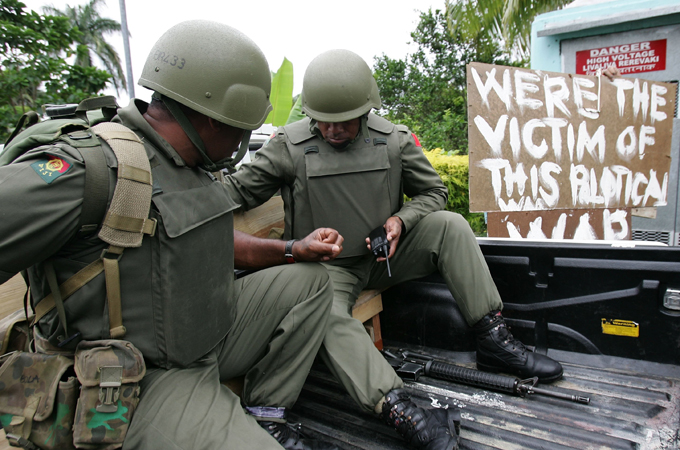Country profile: Fiji
Known for its natural beauty, the nation of islands has faced political unrest and a series of military governments.

 |
| Since gaining independence in 1970, Fiji has been hit by four coups [GALLO/GETTY] |
Comprised of more than 300 coral and volcanic islands and known for its sea swept beauty, Fiji gained independence from Britain in 1970.
After an initial period of post-independence democracy, the country has seen four coups since 1987.
During almost a century of colonial rule, the British brought thousands of indentured Indian labourers to the country, creating the demographic conditions which have been linked to recent political unrest.
The first two coups, both initiated by the military in 1987, were said to have been caused by the Indian community’s perceived dominance in the government.
The country’s population of about 900,000 is almost equally divided between indigenous Fijians and the descendants of ethnic Indians.
Military rule
Voreqe Bainimarama, the current leader, took power in December 2006 after ousting Laisenia Qarase, a democratically elected prime minister, in a military coup.
Bainimarama imposed emergency regulation in 2009, abrogating the constitution and banning public meetings.
Under these emergency laws, security forces arrested Mahendra Chaudhry, a former prime minister and opposition activist, in October 2010.
Chaudry, Fiji’s first leader of Indian descent, was elected prime minister in 1999. He was overthrown a year later in a civilian coup led by George Speight, an ethnic Fijian who was considered a nationalist. In this coup, Chaudry and about 30 others were held hostage for several weeks.
Elections in 2001 brought Laisenia Qarase to power, who in turn was overthrown by Bainimarama.
Bainimarama had promised to hold elections in 2009 but now says they will take place “no later” than 2014.
The current military-led interim government has also placed the media, which had been known for its openness, under heavy censorship, demanding that publications “toe the line.”
The United States has criticised the military-backed government and the European Union has suspended aid payments worth tens of millions of dollars over Bainimarama’s failure to commit to holding free elections.
Economy
The country’s economy is largely dependent on remittances from migrants working abroad and tourism, with about 400,000 people visiting annually. But the industry has been hit by the unrest.
Sugar production also plays a major role in the economy and problems in the industry have had political ramifications.
After holding a meeting with sugar farmers, Chaudry, the ousted prime minister, was arrested in October 2010.
Bainimarama’s government had attempted to modernise the industry with new crushing mills, but the plan backfired and led to a collapse in production.
Despite its political troubles, rising sea levels likely caused lby global warming present the largest single challenge to the country of islands.
“The threat of climate change, particularly sea level rise, continues to hang over us all,” Bainimarama said during a visit to the UN General Assembly in September 2010.